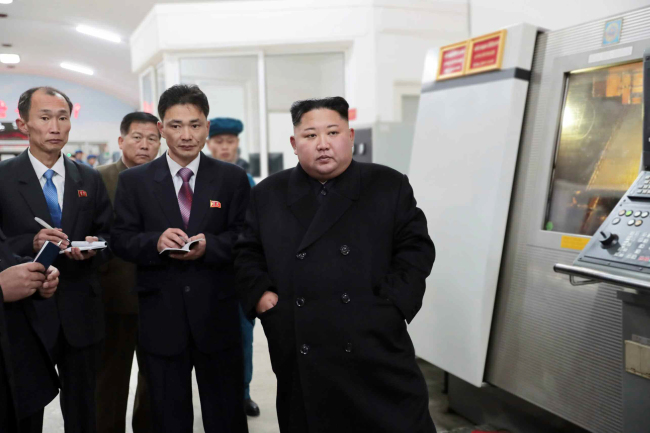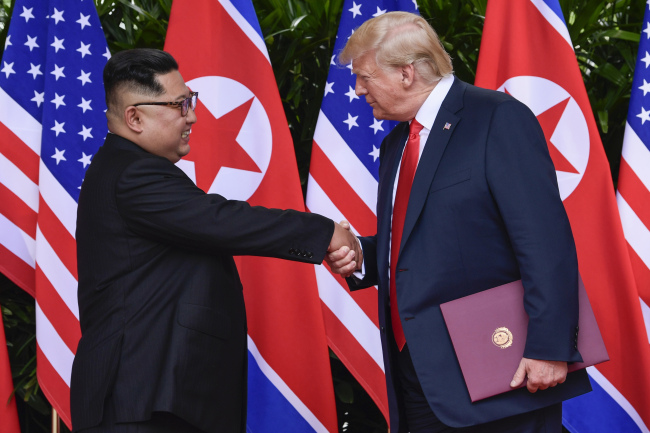NK’s economy likely to decline futher in 2019, but variables exist
By Jung Min-kyungPublished : Nov. 25, 2018 - 17:16
With North Korea expressing its willingness to denuclearize at the landmark summit with the US in June, many thought that it would be a matter of time before the sanctions layered against the regime were lifted.
Fast forward almost some five months later, the US-led pressure campaign has only grown stronger, continuing to choke the North economically.
Fast forward almost some five months later, the US-led pressure campaign has only grown stronger, continuing to choke the North economically.

North Korea has been keeping its impoverished economy afloat in 2018, despite one of the most crippling UN sanctions imposed in late 2017. But the economy is likely to be dealt with a serious blow next year, if the pressure campaign continues on the same level as this year, experts say.
“North Korea has been maintaining a certain level of economy with its import-substitution policy, which focuses on domestic business and consumption,” said Yang Un-chul, director of the Center for North Korean Studies at the Sejong Institute.
According to a US-based monitoring website 38 North last month, while some sectors of the economy such as coal and seafood exports have been disrupted, the consumer economy overall has been minimally affected.
Nevertheless, 2019, is likely to be a harsh year for North Korea, according to Yang.
“In order to achieve economic growth, an economic boom needs to take place across the country, but under the current circumstances, it seems almost impossible,” the Seoul-based analyst added.
Yang said that North Korea has been pushing its people to work harder -- which is a shift from the socialist country’s usually “relaxed” work environment -- to cope with the blow of crippling sanctions. An increase in domestic supply and demand coupled with cheap labor force is keeping its consumer economy alive, he said, though overall, it may be a different story.
The UN sanctions, which have been negatively effecting its trade relations with China, is also expected to leave more bruises. China accounts for 90 percent of the isolated regime’s total trade.
When the UN Security Council resolutions banning exports of coal and other materials from the North was announced in 2017, experts said it would take time for the blows to take effect.
Financial reports indicate that North Korea’s economy was not actually doing so well in 2017. An estimate released in July by South Korea’s central bank, the Bank of Korea, had the North’s GDP decreasing 3.5 percent in 2017. It was interpreted as the biggest contraction since the famine years of the late 1990s.
However, Yang also noted that the uncertainties that surround the US-North Korea talks, and Washington’s willingness to maintain a momentum of dialogue with Pyongyang as factors that may prevent the North’s economy from further decline.
The UN Security Council on Friday granted a sanctions exemption to enable the two Koreas to conduct a survey on modernizing and reconnecting railways across the border. Though the Seoul government said last week that the US had agreed to fully support the railway project, skepticism had persisted on whether the joint survey would be realized given the US’ concerns that the inter-Korean projects were not in tandem with progress in North Korea’s denuclearization.

The joint survey has been pushed back since August over US’ concerns that it might violate UN sanctions, which calls for strict limits on shipments of fuel and other goods to the North. It is known that the South would have to transport fuel and equipment into the North for the study.
Some saw the UN approval last week as the start of a gradual sanctions alleviation, while others warned that it is too early to interpret it as such.
“The joint survey is quintessentially not subjected to UN sanctions and the UNSC’s decision is limited to the survey – it is merely an agreement over a detail, which is transportation of fuel to North Korea,” Shin Beom-chul, a senior fellow at the Asan Institute for Policy Studies said.
“The project (to connect the railways) itself is viewed as coming under UN Security Council Resolution 2375, which prohibits forming of joint ventures or cooperative entities with North Korea,” he said.
North Korean leader Kim Jong-un in recent months has been giving field guidance at key economic sites across his country, emphasizing the spirit of “self-reliance” to his people, but experts say that the fate of the North’s economy now depends mostly on its nuclear talks with the US.
China and Russia are calling on the international community to lift the sanctions against the North, but China seems to be calculating how the North Korea hand could be played in its trade war with the US.
With no solid data on the North’s economy available, too many variables exist to make an accurate forecast of the country’s economic performance.
Ri Ki-song, a senior researcher with the Economic Institute of the North’s Academy of Social Sciences, recently told AP that despite the layers of sanctions, his country’s economy had maintained steady growth — with its GDP increasing from $24.998 billion in 2013 to $29.595 billion in 2016 and $30.704 billion in 2017. This directly contradicts the Bank of Korea’s report.
“It’s true that the North’s economy has been hurt because of the sanctions and will be further damaged if it stays on the current track. However, too many uncertainties exist to make a solid forecast,” said Yang.
(mkjung@heraldcorp.com)






![[From the Scene] Monks, Buddhists hail return of remains of Buddhas](http://res.heraldm.com/phpwas/restmb_idxmake.php?idx=644&simg=/content/image/2024/04/19/20240419050617_0.jpg&u=20240419175937)








![[From the Scene] Monks, Buddhists hail return of remains of Buddhas](http://res.heraldm.com/phpwas/restmb_idxmake.php?idx=652&simg=/content/image/2024/04/19/20240419050617_0.jpg&u=20240419175937)

![[KH Explains] Hyundai's full hybrid edge to pay off amid slow transition to pure EVs](http://res.heraldm.com/phpwas/restmb_idxmake.php?idx=652&simg=/content/image/2024/04/18/20240418050645_0.jpg&u=20240419100350)

![[Today’s K-pop] Illit drops debut single remix](http://res.heraldm.com/phpwas/restmb_idxmake.php?idx=642&simg=/content/image/2024/04/19/20240419050612_0.jpg&u=)